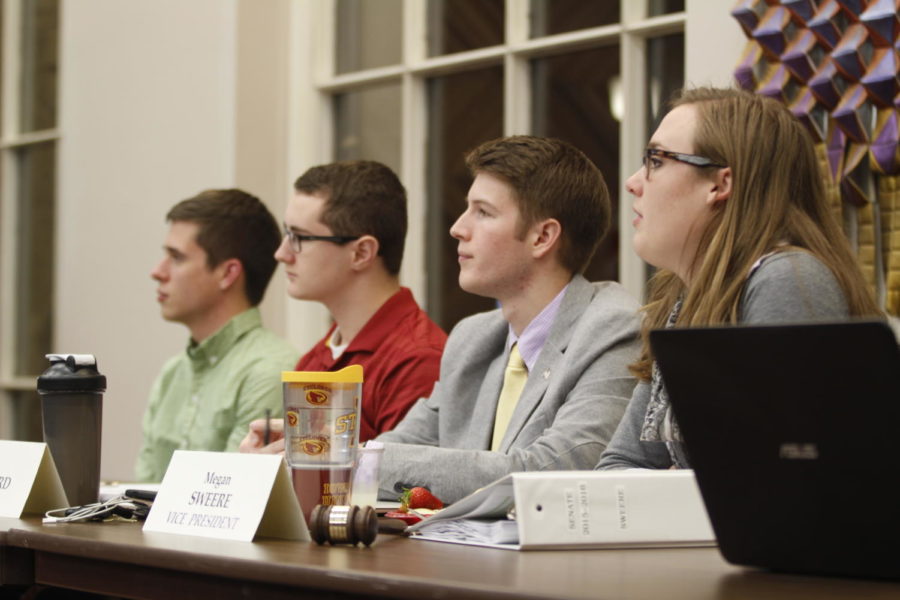Student Government gearing up for elections
Michaela Ramm/Iowa State Daily
(R to L): Vice President Megan Sweere, Speaker of the Senate Ben Crawford, Vice Speaker Michael Snook and City Council Student Liaison Sam Schulte take part in the joint meeting between Student Government and Ames City Council on Wednesday.
February 4, 2016
The Student Government election commission is gearing up for this year’s elections, and it will be up to students to DeCyde The Vote.
DeCyde The Vote is the Student Government campaign to let students know about the candidates for election and to remind them to vote.
The election commission’s vice commissioner Robert Stokka, senior in political science, is working closely with the Student Government’s public relations committee to get the word out about the elections and the importance of voting.
“Student Government isn’t just a club, it’s actually something that is a big part of Iowa State,” Stokka said. “It’s a lot bigger than people understand because they don’t take the time to look into it.”
There will be 37 Senate seats open, as well as the positions of president and vice president. Candidates must register with a small biography of themselves and an official letter of intent to run by 5 p.m. Friday.
Election commissioner Alex Rodgers, senior in agricultural and life sciences education, said during his four years on the commission that there has never been a full ballot, so there are opportunities for someone who wants to get involved.
“There are always open seats,” Rodgers said, “If someone is interested in being on Student Government, there is probably a way to do it.”
Candidates for the executive office — the president and vice president — have to get at least 500 student signatures to be able to run for the position.
However, there are restrictions on how the signatures may be obtained. Those signatures must be acquired outside of the classroom and be handed into the election commission by Feb. 18.
A big goal of the election commission is to get the word out to the student population to vote. They plan to hand out informational posters, candy, cups and other items to raise awareness among students to remember to vote.
The voter turnout was up last year in comparison to years before, but was only at about 13 percent of the student population. This 13 percent equates to just 4,135 votes. While the percentage may seem low, the number is comparable to other universities across the country. Regardless, the election commission still hopes for a higher turnout.
“We can only dedicate so much time [with classes and other commitments] trying to get people interested to vote,” Stokka said.
One change this year is the avenue that students will use to vote. In previous years, students would have go to a specific website to vote for the candidate of their choice.
However, the election commission paid approximately $6,000 this year to use Qualtrics, a survey company that has been used in the past by the university. Qualtrics will send each student a unique link through email that they can access and then use to vote without having to log in.
An election kickoff rally will take place Feb. 18 for students to learn about candidates and Student Government elections, once again as part of a big push to get students to vote.
Student Government is made up of elected officials, whose duty it is to meet with university administrators and officials to meet the needs of students. The elections are key to the process, it’s how the leaders get selected, Rodgers said.
“It’s really important we get the right people with the right motivation,” Rodgers said. “People with energy and people who have really good leadership qualities in the right positions to make a difference on campus.”







